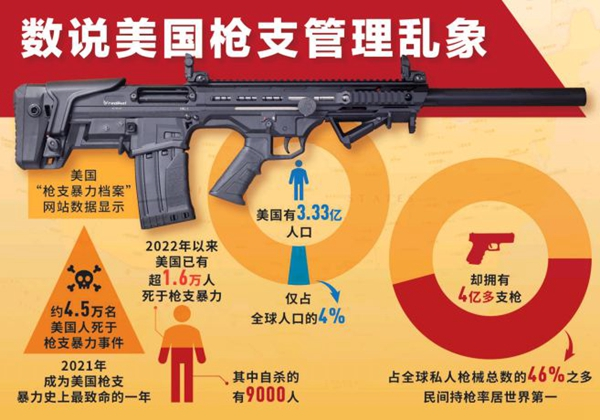In the latest tragedy hitting the United States, as many as 18 people were killed and 13 injured in a mass shooting in Lewiston, in the state of Maine, on Wednesday evening, with the suspect confirmed dead two days later.

As of Thursday, there have been 565 tragic incidents of shootings resulting in at least four casualties each in the United States this year, with the Lewiston shooting the deadliest one, according to the U.S.-based “Gun Violence Archive.”
The United States is home to frequent gun massacres, with innocent lives taken. Yet, progress on gun control is at a standstill. A political system wherein relevant parties constrain each other, an increasingly polarized political ecology, powerful interest groups and intensifying social conflicts have made gun violence a chronic disease and recurring nightmare in American society.
The United States has the largest number of civilian guns in the world, with more guns than people. According to a recent poll by the Pew Research Center, 61 percent of Americans believe it is too easy to legally obtain a gun.
As a result of its history of colonial plunder, the United States has a strong gun culture. At present, the provisions on gun control vary from state to state, and gun control and cross-state law enforcement face many challenges. Maine, where the latest shooting took place, has one of the loosest gun controls in the United States and does not require a permit to buy or carry a gun.
According to a police statement, the suspect is a U.S. Army reservist who had reported mental health issues. Allowing at-risk groups to freely possess assault weapons is an institutional failure.
At the same time, gun problems are also an indicator of America’s social pain, an inevitable result of a yawning wealth gap, racial discrimination and other increasingly severe social issues, illustrated by frequent violent incidents and urban crime waves.
Take race. Statistics show that black people are far more likely to be murdered by guns than white people, and half of gun murder victims are black people. In the face of growing racial discrimination, the rate of gun ownership of people of color and ethnic minorities is increasing.
Despite the deadly consequences of the gun epidemic, the Democratic and Republican parties in the United States are not eager to solve the problem. Instead, they have been using gun violence to lash out at each other, with control legislation stuck idle in the debate. Meanwhile, gun rights advocacy groups have been engaged in money politics, helping fuel the bitter war between the two parties.
As ordinary civilians continue to suffer from the chronic gun violence and inadequate policy responses, people cannot help but wonder: How can a country, unable to even protect the most basic right to life, have the courage to present itself as a “beacon of human rights” in the world?
With every shooting tragedy comes a brief upsurge in discussing the need for gun control in American society. Still, American politicians do nothing except offer empty rhetoric until another shot is fired in a never-ending deadly cycle.
In July this year, around the country’s “Independence Day” holiday, more than 20 mass shootings took place in the United States. In response to the spate of shootings, the White House stated on July 4 that it grieved “for those who have lost their lives, and as our nation celebrates Independence Day, we pray for the day when our communities will be free from gun violence.”
But for Americans living in the toxic cloud of gunfire, they need a lot more than prayers.